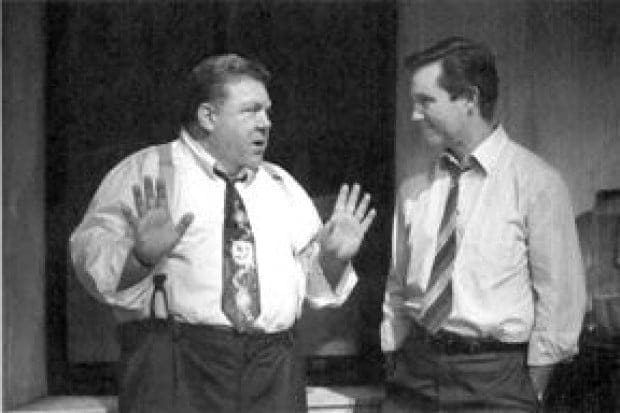‘Twelve Angry Men’ holds its own today
By Juliet Schoen / Staff Writer
“Twelve Angry Men,” is being touted as “the greatest courtroom drama of all time.” After seeing the production at the Ahmanson Theater, I have no argument. Written by Reginald Rose for television more than 50 years ago, the translation from the small screen to the stage still works extremely well.
Placing men with disparate life experiences within the confines of a small, overheated jury room, Rose examines the responsibility of citizens to make honest judgments in dealing with a matter of life and death. And, indeed, those are the alternatives for the 16-year-old defendant accused of murder.
Although the boy’s guilt may seem clear, the jurors argue throughout the day about the overhanging consideration that there cannot be a guilty verdict if there is “reasonable doubt.” Since a unanimous verdict is required, the jurors dig deep into their consciences to come up with the final decision. Each of the men reveals his character in this cleverly crafted drama. The bigot, the angry father, the lazy thinker are all exposed.
The set by Allen Moyer is admirably convincing. The jury room set smacks of reality as the men sit around a boardroom table, watch the typical round clock on the wall, try to fix the inoperable fan and look out the window as if seeking freedom from the onerous task.
Richard Thomas is the doubting Thomas of the panel who is not convinced of the boy’s guilt. Gradually he sifts through the evidence and points out flaws that were not spotted by the court-appointed defense lawyer. As the foreman, George Wendt has little to do, but he has one telling scene where he tries to throw his considerable weight around.
Since the jurors are only identified by number, we must simply list the other 10 participants, all positively splendid. They are Todd Cerveris, Randle Mell, Jeffrey Hayenga, Jim Saltouros, Charles Borland, Mark Morettini, Alan Mandell, Julian Gamble, David Lively and T. Scott Cunningham. These jurors are hot and tired and cantankerous as the day wears on, but the search for a verdict must be found.
Scott Ellis, the director, does a masterful job of making the jury experience engrossing.
“Twelve Angry Men,” written during the Golden Age of television, feels achingly modern, although there are no women or minorities on the panel. This is a well crafted drama. Although the dénouement may not be totally credible, it is thoroughly satisfactory.

